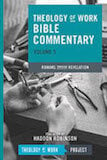2 Timothy: Encouragement for a Faithful Worker
Bible Commentary / Produced by TOW Project
The letter of 2 Timothy, like 1 Timothy, is addressed from the Apostle Paul to his younger co-worker and is perhaps the last written letter we have from Paul. Unlike 1 Timothy, however, 2 Timothy appears to be more of a personal letter in which Paul encourages Timothy and gives him a solemn charge to remain faithful even after Paul has departed. The very fact that 2 Timothy has been preserved and included in the Christian canon of Scripture indicates, however, that this personal letter has significance beyond its original, particular context.
Cultures Can Persist for Generations (2 Timothy 1:1–2:13; 3:10–17)
Back to Table of Contents Back to Table of ContentsOne of the striking features of 2 Timothy is the theme of generational faithfulness. Toward the beginning of the letter Paul reminds Timothy of the faith that lived in his grandmother, his mother, and then in Timothy himself (2 Tim. 1:5). This progression suggests that the faithful witness and example of Timothy’s grandmother and his mother were among the means God used to bring Timothy to faith. This understanding is confirmed later in the letter when Paul encourages Timothy to “continue in what you have learned and firmly believed, knowing from whom you learned it, and how from childhood you have known the sacred writings” (2 Tim. 3:14–15a). Paul too, as a member of an older generation, is a model for Timothy to follow. Paul writes, “Join with me in suffering for the gospel” (2 Tim. 1:8), “Hold to the standard of sound teaching that you have heard from me” (2 Tim. 1:13), and “You have observed my teaching, my conduct, my aim in life, my faith, my patience, my love, my steadfastness, my persecutions” (2 Tim. 3:10–11a).
Not only has Timothy received teaching from previous generations, but Paul intends for him to pass on what he has learned to succeeding generations as well: “What you have heard from me through many witnesses entrust to faithful people who will be able to teach others as well” (2 Tim. 2:2). This theme challenges Christian workers to consider what kind of legacy they want to leave behind at their places of employment and in their industry. The first step toward leaving a positive legacy is to do your job faithfully and to the best of your ability. A further step would be to train your successor, so that whoever is going to replace you one day is prepared to do your job well. A Christian worker should be humble enough to learn from others and compassionate enough to teach patiently. Yet in the end, Christian workers must ask themselves whether they left a legacy of redemption in words and deeds.
The generational aspect of 2 Timothy applies not just to individuals, but to all kinds of corporations, both for-profit and not-for-profit. The corporate form was created so that organizations could outlive the individuals who comprise them, without the need to reform the entity at each transition. One of the basic principles of financial audits is that the corporation must be a “going concern,” meaning that it must be operating in a sustainable manner.[9] When an organization’s pay practices, debt burden, risk management, financial control, quality control, or any other factor become seriously detrimental to its sustainability, its leaders have a duty to call for change.
This does not mean that corporations should never merge, disband, or otherwise go out of existence. Sometimes an organization’s mission has been fulfilled, its purpose becomes obsolete, or it ceases to provide significant value. Then its existence may need to end. But even so, its leaders have a responsibility for the legacy the corporation will leave in society after it is dissolved. For example, a number of companies expose their retirees to the risk of poverty because they have not adequately funded their pension liabilities. Municipal and state governments are even more prone to this failing. Organizations have a duty—from both a biblical and a civic perspective—to ask whether their operations are shifting liabilities to future generations.
Likewise, 2 Timothy suggests organizations must operate in an environmentally and socially sustainable way. To depend for success on unsustainable resource extraction or environmental pollution is a violation of the generational principle. To deplete the community’s “social capital”—meaning the educational, cultural, legal, and other social investments that provide the educated workforce, means of transactions, peaceable society, and other factors that workplace organizations depend on—would also be unsustainable. To a certain degree, workplaces invest in environmental and social capital by paying taxes to support governments’ environmental and social programs. But perhaps they would have more reliable access to environmental and social capital if they did more to create sustainable systems on their own initiative.
Guard the Tongue (2 Timothy 2:14–26)
Back to Table of Contents Back to Table of ContentsIn the next section, Paul counsels Timothy with a number of exhortations that could directly apply to the workplace. Paul repeatedly warns Timothy to avoid “wrangling over words” (2 Tim. 2:14), “profane chatter” (2 Tim. 2:16), and “stupid and senseless controversies” (2 Tim. 2:23). This is a good reminder for Christian workers that not all talk at the water cooler is profitable, even if it is not downright evil. Are the conversations we engage in and the ways we speak helpful to those around us? Do our words serve as ambassadors of reconciliation and redemption (2 Cor. 5:20)? Unhelpful conversations can spread like gangrene (2 Tim. 2:17), lead to ruin and impiety (2 Tim. 2:14, 16), and breed quarrels (2 Tim. 2:23). One thinks of similar warnings in James (cf. James 3:2–12) about the destructive potential of words.
In fact, the most important form of witness to Jesus is the way Christians talk with co-workers when we’re not talking about Jesus. Three words of gossip may destroy three thousand words of praise and piety. But Christians who consistently encourage, appreciate, respect, and demonstrate care by their words are a powerful witness for Jesus, even if their words are seldom directly about him. Humility and strictly avoiding judgmentalism are the surest ways to avoid stupid and senseless controversies.
Paul also urges Timothy to “shun youthful passions and pursue righteousness” (2 Tim. 2:22). This may remind us that employees bring their personal difficulties with them to work. Alcohol and drug abuse affect virtually every workplace, and “fully one quarter of employees who use the Internet visit porn sites during the workday . . . and hits are highest during office hours than at any other time of day.”[10] Another exhortation that can be applied to Christian workers is that “the Lord’s servant must not be quarrelsome but kindly to everyone, an apt teacher, patient, correcting opponents with gentleness” (2 Tim. 2:24–25a). Indeed, much of the portrait Paul sketches of Timothy in this letter could be held up as something for Christian workers to strive toward. Paul, writing a letter to Timothy, becomes a support network for him. We might ask what kinds of support networks today’s organizations would do well to provide for workers.
The Time of Difficulty Is Now (2 Timothy 3:1–9)
Back to Table of Contents Back to Table of ContentsThe fourth and final chapter of 2 Timothy consists mainly of Paul’s charge to Timothy, Paul’s reflections on his life, and specific instructions and greetings. There is no doubt that some of this material could apply indirectly to work. However, we will examine just one more paragraph in the letter—2 Timothy 3:1–9.
The first verse gives the main point of the paragraph. “In the last days distressing times will come” (2 Tim. 3:1). What the description that follows makes clear, however, is that Timothy is living in these last days already (cf. 2 Tim. 3:2, 5). That the “last days” are already upon all of us is the clear and consistent witness of the New Testament (see Acts 2:17; Heb. 1:2; James 5:3; 2 Pet. 3:3). Christians need to be prepared for the hardship and suffering associated with these last days. Paul later warns, “Indeed, all who want to live a godly life in Christ Jesus will be persecuted” (2 Tim. 3:12).
This is a sobering reminder to those Christians who work in environments that may be difficult but are far less threatening than the social realities of the first century or of many places in the world today. As Christians, we should expect mistreatment at work, injustice, prejudice, opposition, and mockery. If we experience few of these things, we have cause for rejoicing, but we should not allow our present benevolent working conditions to lull us to sleep. The days may be coming when being faithful to Christ at work results in more than strange looks and jokes behind our backs. Indeed, workers at any time might find themselves pressured to act unethically or contrary to God’s word. At that time it will be seen more clearly whether we have more than a mere “outward form of godliness” (2 Tim. 3:5). If we do, we know that God will stand by us and give us strength (2 Tim. 4:17).

.jpg)







.jpg)


